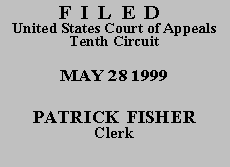

| EDGAR MILTON THOMPSON,
Petitioner-Appellant, v. CHARLES E. SIMMONS; ATTORNEY GENERAL OF KANSAS, |
|
Edgar Thompson, a state prisoner appearing pro se, seeks a certificate of appealability to appeal the district court's dismissal of his 28 U.S.C. § 2254 habeas petition on statute of limitation grounds. As Thompson has failed to make a "substantial showing of the denial of a constitutional right," 28 U.S.C. § 2253(c)(2), we deny a certificate of appealability and dismiss the appeal.
Thompson pleaded guilty in 1992 to one count of indecent liberties with a child and one count of assault, and was sentenced to three to ten years' imprisonment. His appeal in state court was affirmed. Thompson filed an application for post-conviction relief on February 26, 1996, and, while the application was still pending, he filed a habeas petition with the Kansas Supreme Court based on the same grounds as those asserted in his application. His state habeas petition was denied on September 6, 1996, and Thompson filed his federal habeas petition on January 12, 1998. The district court dismissed the petition as untimely under 28 U.S.C. § 2244(d)(1).
Under the Antiterrorism and Effective Death Penalty Act (AEDPA), a one-year limitation period applies to the filing of a habeas petition by a person in custody pursuant to a state court judgment. The limitation period runs from the date on which a judgment becomes final by conclusion of direct review or expiration of time for seeking review. 28 U.S.C. § 2244(d)(1)(A). A petitioner whose conviction became final on or before April 24, 1996 (the effective date of the AEDPA), has one year from that date to file a habeas petition. Miller v. Marr, 141 F.3d 976, 977 (10th Cir. 1998).
The AEDPA identifies circumstances requiring a tolling of the limitation period. See 28 U.S.C. § 2244(d)(1) & (2). The only provision relevant here is "[t]he time during which a properly filed application for State post-conviction or other collateral review with respect to the pertinent judgment or claim is pending shall not be counted toward" the one-year time limit. Id. § 2244(d)(2). Although Thompson had a valid post-conviction application pending in state court from April 24, 1996, through September 6, 1996, once the Kansas Supreme Court denied his state habeas petition on September 6, 1996, the clock began to run on his one-year federal habeas time limitation period. Accordingly, Thompson had until September 6, 1997, to file a federal habeas petition and his petition filed on January 12, 1998, was outside the statute of limitations.
Thompson suggests he is actually innocent of the crimes to which he pleaded guilty. While we have intimated actual innocence may be grounds for equitable tolling under § 2244(d)(1), we have emphasized that prisoners must diligently pursue their claims to avail themselves of equitable tolling. See Miller, 141 F.3d at 978. Further, Thompson has not supported his allegation of innocence with evidence sufficient to undermine our confidence in the outcome of his criminal proceedings. See Schlup v. Delo, 513 U.S. 298, 316 (1995).
Thompson's application for a certificate of appealability is DENIED and the appeal is DISMISSED. The mandate shall issue forthwith.
Entered for the Court
Mary Beck Briscoe
Circuit Judge
*. This order and judgment is not binding precedent, except under the doctrines of law of the case, res judicata, and collateral estoppel. The court generally disfavors the citation of orders and judgments; nevertheless, an order and judgment may be cited under the terms and conditions of 10th Cir. R. 36.3.